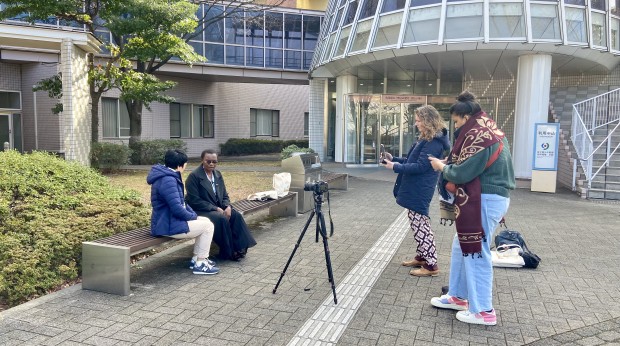How do local peacebuilders view the UN80 Initiative? An opportunity to strengthen the UN’s impact at the local level
Reforming the United Nations system is far from new, though today’s fractured geopolitical landscape adds new urgency to the discussion. In September 2021, the UN Secretary-General presented Our Common Agenda as a catalyst for making the UN ‘fit for purpose’ through the UN 2.0. Member States committed to this vision through adopting the Pact for the Future, which respective Working Groups are regularly reviewing. However, in practice, this has not been enough to drive meaningful reform in the UN system.
As the UN approaches its 80th Anniversary, it has made a concrete commitment to ‘strengthen the UN system and deliver for those who depend on [it]’ through the UN80 Initiative. Member States’ discussions on the UN80 have highlighted that the UN Charter should underpin this process.
The UN Charter clearly states that it is ‘the peoples’ (not ‘Member States’) who have established the United Nations, and therefore, they should have a say in how the UN should be reformed.
To bring the voices of the people into the conversation, GPPAC asked local peacebuilders within its network: What do you expect from the UN80 Initiative? Here is what we have learned:
First, the UN80 Initiative has great potential to increase the UN’s impact on the ground by decentralising decision-making. Strategically relocating peace and security personnel closer to the field and decentralising political, peace and peacebuilding resources would help address the current lack of peacebuilding action at the field level in many contexts. Local peacebuilders have frequently emphasised the lack of clarity in peacebuilding leadership at the country level, with an often ambiguous division of roles and responsibilities related to peacebuilding amongst UN actors. For instance, in different countries across Africa, peacebuilding focal points within the UN Country Teams (UNCTs) are different UN actors who were fortunate to receive grants from the Peacebuilding Fund. Moreover, a stronger presence of the UN at the local level improves visibility and trust-building between UN leadership and local communities.
The UN80 Initiative should further clarify how peacebuilding decision-making will be moved closer to the field level. Recognising the contribution of the UN Development System to peacebuilding, Resident Coordinators (RC) should act as a representative of the Secretary-General at the field level to support peacebuilding and sustaining peace. As part of this role, RCs should have a clear peacebuilding strategy and adequate support, including through a more robust deployment of peace and development advisors. The pooled funds available for peacebuilding at the country level can be managed by the RC to limit competition between entities for resources. Some RC Offices, where this practice is already in place, are known to dedicate resources to different entities each round and encourage joint programming.
Second, the UN80 Initiative should include local communities. Local peacebuilders have offered numerous recommendations on how the UN can deliver more impactful results at the field level. However, these contributions are often undervalued compared to those from think tanks and international non-governmental organisations. As a result, multilateral support tends to yield limited results, while there is growing recognition that the UN’s impact could be significantly enhanced through context-specific action driven by local realities, experiences and needs. There are examples of the steering committees and advisory boards that include local peacebuilders (i.e., an advisory board to the Women’s Peace and Humanitarian Fund, Steering Committee for MPTF in Colombia). There are also examples where locally designed programming generates sustainable and long-term results. Often, such modalities are operationalised through the inclusion of a representative(s) of global, regional and national peacebuilding networks in the decision-making processes. Peacebuilding networks, in this, offer valuable modalities as their representatives represent the position of diverse local peacebuilding actors and are accountable to them. Peacebuilding networks lead to more suitable financial mechanisms to ensure impactful action on the ground, as well as shift the decision-making on the main priorities to local communities.
The UN80 Initiative should ensure that local peacebuilders are meaningfully consulted in the development of plans for decentralised decision-making. This means engaging local peacebuilders' networks in the design of the UN80 Initiative across all three work streams of the initiative, treating them as equal partners during the implementation of reached agreements. The partnership between the UN and civil society should become more horizontal, moving away from short-term consultations towards a more structured and long-term collaboration. Such an approach would ensure that local communities can offer recommendations that are seriously considered and deliberated upon, with an adequate feedback loop. It would also help generate local buy-in and support during the implementation phase.
Third, the UN80 Initiative should ‘build on what exists’. The UN80 Initiative should not be solely inward-looking. During the Member States’ discussion on the UN80, a representative of South Africa encouraged the UN to consider reviewing local mechanisms and other initiatives that the UN can build on. Local peacebuilders frequently point out that across many contexts, the UN’s projects and initiatives often mirror and compete with the work being done by local peacebuilders. For example, early warning mechanisms are often developed without recognising that those mechanisms already exist within local peacebuilding networks. The UN similarly launched (in some cases, attempted to launch) new platforms and coalitions without adequately mapping existing initiatives. This issue extends beyond a lack of coordination with civil society. GPPAC’s research in Sudan and Somalia revealed a significant overlap between the UN and AU initiatives.
The UN80 Initiative should focus on amplifying the role of the UN where it adds value. The UN should elevate its role as a convenor and political accompaniment rather than an implementer, focusing on providing technical support and facilitating coordination among peacebuilding stakeholders. Local peacebuilders recognise and support the UN’s ability to bring diverse actors, entities, and stakeholders together and provide important logistical, funding, and political support to local initiatives, including in fragile settings. This role must be further strengthened and improved. The UN must be equipped to support inclusive national peacebuilding priorities, where relevant engaging national governments adhere to the principles of the UN Charter.
The UN80 Initiative should review current partnership modalities. The UN System-Wide Community Engagement Guidelines on Peacebuilding and Sustaining Peace advise the UN field presences on ways to systematise and institutionalise the partnership with civil society and local peacebuilders based on authentic partnership. Similarly, the partnerships with regional organisations should focus on strengthening their capacities to coordinate regional peacebuilding and sustaining peace efforts. One avenue to clarify relationships between the UN and other peacebuilding stakeholders at the field level is by specifying the roles of diverse partners in the Cooperation Framework. This could help address gaps and overlaps in relevant peacebuilding and conflict prevention activities.
Fourth, the UN80 Initiative should address the competition and lack of coherence among UN agencies. Fragmentation within the UN System is not new. The previous UN Reforms launched in 2017 aimed to address this issue, and as far back as 2006, the Secretary-General highlighted the lack of a cohesive, overarching strategy for the UN to support prevention priorities of its Member States. This is a gap that has yet to be filled. It is important that the UN80 recognises this shortcoming, but more importantly, it must take steps to resolve it.
The UN80 Initiative should lead to the establishment of coordination mechanisms/collaboration teams at the field level within the UN Country Teams (UNCT). This would help build mutual trust among UN Agencies, Funds, and Programmes (AFPs), clarify roles, and improve information management. Such mechanisms could encourage joint programming, facilitate joint peacebuilding assessments, including with IFIS, and contribute to the development of a robust and coherent Coordination Framework.
Fifth, the UN80 Initiative should ensure that peacebuilding and conflict prevention are a critical foundation of all work within the peace and security pillar. The conversation about a potential merger between the Department of Political and Peacebuilding Affairs (DPPA) and the Department of Peace Operations (DPO) presents both benefits and challenges. In the Pacific, for example, efforts to bring security actors and peacebuilding actors together have had a positive impact, promoting concrete action rooted in human security. Another benefit of the merger is the increased availability of peacebuilding presences on the ground, as DPPA currently has very limited and mostly regional field presences. At the same time, there is also a real risk that peacebuilding could receive even less attention, particularly when overshadowed by what are perceived as more ‘serious challenges’. We observe it in the UN Security Council every day, where it has been quite difficult to take up prevention conversations and ensure that peacekeeping mandates have a serious peacebuilding focus from the outset of mission development. It is hard to believe that the merger between DPPA and DPO will encourage the Council to be more mindful about peacebuilding mandates of missions. Moreover, the discussions of merging DPPA and DPA should be accompanied by a broader discussion about the role of the UN Development System in peacebuilding and sustaining peace.
The UN80 Initiative should ensure that there are adequate capacities within the system to implement existing resolutions on peacebuilding and sustaining peace. This includes maintaining DPPA’s accountability for peacebuilding action, increasing field-level implementation capacities, as well as ensuring that mandates of peacekeeping and peace operations have conflict prevention and peacekeeping goals and capacities from the outset.
Sixth, the UN80 Initiative should strengthen the role of the UN Development System in peacebuilding and sustaining peace. Effective peacebuilding must involve the entire UN system. Member States increasingly recognise that the UN Development System, including through resident coordinators, have an important role to play in supporting inclusive national priorities on peacebuilding and sustaining peace. However, the resident coordinators normally adhere to the Cooperation Frameworks, which rarely have a peacebuilding focus.
The UN80 Initiative should clearly define peacebuilding responsibilities at the field level. This should include specific performance indicators for the Resident Coordinators and Heads of the UN Country Teams (UNCTs). Every UNCT should have a dedicated peacebuilding strategy, unless peacebuilding priorities are outlined in the Cooperation Frameworks. This could enhance cooperation, collaboration, and coordination of peacebuilding efforts, including through agency-specific actions and inter-agency collaboration at the country level. The availability of country-level pooled funds for peacebuilding, with a dedicated funding window for civil society, is an important priority; however, there is a need to ensure a linear and participatory division of funds. Further, while rotating leadership may foster inclusivity and local ownership, it has the potential to weaken accountability and impede long-term relationships required for impact.
Finally, the UN80 Initiative alone is not sufficient to improve coordination and coherence within the UN. Concerns about the lack of coordination and coherence are not new with UN action on conflict prevention, as a clear example. Since 20023, there has been a growing recognition that the UN prevention ecosystem remains fragmented. These concerns have been echoed in subsequent resolutions and the Secretary-General’s report, without being addressed. A similar situation exists for peacebuilding action at the field level, where peacebuilding leadership is often absent, despite the recognition that peacebuilding must involve the entire UN System. It is important to recognise that competition among UN entities, as well as with civil society and regional organisations, is donor-driven, with donors not encouraging coherence and coordination, prioritising their own political goals.
The UN80 Initiative should encourage the use of pooled funding mechanisms and joint programming. This could incentivise collaboration and joint engagement. Each country has to have a dedicated peacebuilding pooled fund, where the distribution of resources should be guided by a steering committee with the participation of national and local actors. While the current political realities make it hard for donors to engage in pooled funding mechanisms, bilateral engagement has a risk of duplication and limiting impact. The systems of incentives for the donors to engage in pooled funding mechanisms should be developed.
There were many attempts by the UN System to reform itself, with the latest UN reform taking place since 2018. These processes brought about some progress; however, the possibilities of impact continuously fell short against the lack of political will and limited buy-in within communities. As the UN System once again onboards on the path towards a more impactful delivery on its mandate, it is important to consider the ways to incorporate local perspectives in this process to ensure that the UN 80 Initiative succeeds in its mission to support ‘the People’.


